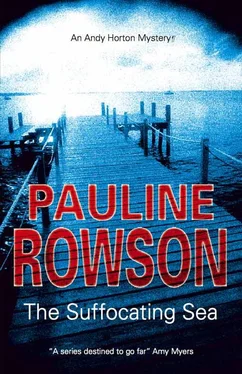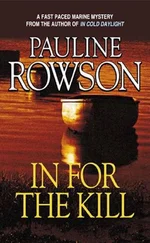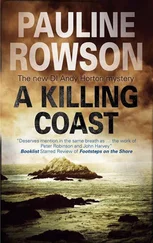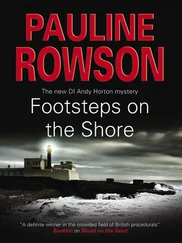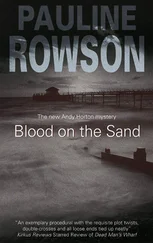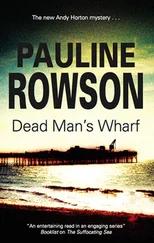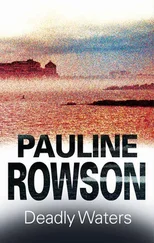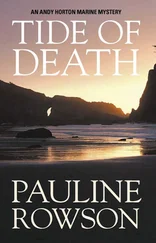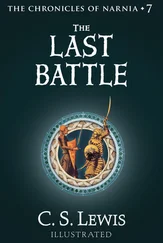Pauline Rowson - The Suffocating Sea
Здесь есть возможность читать онлайн «Pauline Rowson - The Suffocating Sea» весь текст электронной книги совершенно бесплатно (целиком полную версию без сокращений). В некоторых случаях можно слушать аудио, скачать через торрент в формате fb2 и присутствует краткое содержание. Жанр: Полицейский детектив, на английском языке. Описание произведения, (предисловие) а так же отзывы посетителей доступны на портале библиотеки ЛибКат.
- Название:The Suffocating Sea
- Автор:
- Жанр:
- Год:неизвестен
- ISBN:нет данных
- Рейтинг книги:5 / 5. Голосов: 1
-
Избранное:Добавить в избранное
- Отзывы:
-
Ваша оценка:
- 100
- 1
- 2
- 3
- 4
- 5
The Suffocating Sea: краткое содержание, описание и аннотация
Предлагаем к чтению аннотацию, описание, краткое содержание или предисловие (зависит от того, что написал сам автор книги «The Suffocating Sea»). Если вы не нашли необходимую информацию о книге — напишите в комментариях, мы постараемся отыскать её.
The Suffocating Sea — читать онлайн бесплатно полную книгу (весь текст) целиком
Ниже представлен текст книги, разбитый по страницам. Система сохранения места последней прочитанной страницы, позволяет с удобством читать онлайн бесплатно книгу «The Suffocating Sea», без необходимости каждый раз заново искать на чём Вы остановились. Поставьте закладку, и сможете в любой момент перейти на страницу, на которой закончили чтение.
Интервал:
Закладка:
He groaned at the sight of his in-tray, which was overflowing on to his chair. There were pieces of paper with yellow Post-it notes stuck on them, urging him to attend to this report, or review this file, or call someone back, but there was one file that caught his eye. Ignoring all the others he picked it up and sat down.
It was thicker than he had anticipated. He could hardly breathe through fear of what he might be about to read on his mother and tried to steel his heart to repel the emotions that he felt sure were bound to assail him. Urging himself to consider this as just another missing person's case, and perhaps one which might provide him with some idea of what the Gilmores had been up to in 1977, he read on. Very soon, though, he found that his emotions were firmly in check and his police training had asserted itself. The investigation into Jennifer Horton's disappearance had been more thorough than he had expected.
A woman had formally reported Jennifer missing; she'd been listed as Horton's head teacher. He remembered her teasing the information out of him and went cold as he recalled that terrible day when he had eventually been taken from school by a social worker back to the flat and from there to a dismal house full of smells, other children and cold, tiny rooms. He shuddered and quickly turned his thoughts back to the file. There had followed a series of interviews with the people who had worked with Jennifer and her neighbours, including the lady that Horton had spoken to earlier at Jensen House, Mrs Cobden. There wasn't much more to add to the information that she'd already given him. Jennifer had left the flat at about one o'clock that day. She had been wearing her best clothes, and make-up, and was in good spirits. Mrs Cobden said she thought Jennifer was going to meet a man, though she had no real evidence to back that up.
Police officers then interviewed Jennifer's work colleagues. Horton flicked through the reports; there were no interviews with Jennifer's friends. Why not? Didn't she have any? And what about her family? Then his eye caught one report. No family. Both parents dead. Yet the report by a PC Stanley was inconclusive. It didn't say how her parents had died, when or where, and neither did it mention any relatives, save himself as next of kin.
His e-mail alert told him that the press cuttings agency had come through with the articles on Gilmore. Reluctantly he pushed the file on his mother aside and scrolled down them, clicking on the headline of one or two, opening the file and skim-reading the articles. He was disappointed to find no photograph of Warwick Hassingham. It seemed a waste of time, but he persisted.
It wasn't until he reached 1997 that he began to see a common factor. He sat up. With a racing heart he clicked back and then onwards again. Yes, several articles had been written by the same journalist: David Lynmor.
Onward Horton clicked and read, oblivious to the noises from outside his office. Then David Lynmor was no longer writing articles on the Gilmores. When did that happen? He checked back. The last one had been September 1997. Was that date significant?
Horton sat forward and steepled his fingers in thought, tapping them against his mouth. The timing was right for the skeleton in the air-raid shelter. But Lynmor could have changed jobs, or emigrated. He could have been run over by the number nine bus, joined a commune, or married an heiress, but Horton knew, by that feeling in his gut, that he hadn't done any of those things.
Lynmor had written extensively about the fishing industry and interviewed the Gilmores on several occasions — many more times, Horton guessed, than had finally appeared as articles in the newspaper and the fishing press. Perhaps he had become too curious? Had he discovered something that Sebastian Gilmore wanted kept quiet? Like drug smuggling? Was Lynmor's death, not Peter Croxton's, the secret that Tom Brundall had wanted to confess? He'd got the right theory, just the wrong dead man who had ended up a skeleton in the air-raid shelter.
Clearly, judging by one article Horton now read, David Lynmor had met Rowland Gilmore, because he'd written about the fisherman turned vicar. Had Lynmor discovered something that had made Rowland run to brother Sebastian who had summoned Tom Brundall? Had the three of them killed David Lynmor and stuffed his body in the air-raid shelter? And if so who were Lynmor's relatives?
Horton rose, his mind racing as he considered this new theory. It was possible. His phone rang and, irritated at being interrupted in his train of thought, Horton snatched it up.
'I've just got back from interviewing Russell Newton.'
It took Horton a moment to realize he was speaking to Inspector Guilbert from Guernsey. Now he gave him his full attention.
'He remembers the day on board his boat with Brundall quite well because their party was gatecrashed,' Guilbert continued.
Horton was ahead of him. 'Let me guess: by a journalist.'
'Yes, and a photographer who took that picture.'
'Of course.' Horton clicked his fingers. 'I knew there was something odd about that picture. Brundall isn't only looking surprised and shocked at having his photo taken, but he's not looking directly into camera, he's looking to the right of it, at the reporter.' And Horton wouldn't mind betting who that reporter was. 'Does Newton know the reporter's name?'
'No. The photographer was local though. I checked with the newspaper office. He was called Jacobs. He died in a car crash in August 1996, two weeks after that photograph was taken. His car veered off the road, went over the cliff and burst into flames. He'd been drinking heavily.'
'Or had drink poured down his throat,' rejoined Horton.
'You think it's suspicious?' Guilbert asked, surprised.
'Oh, yes, bloody suspicious. I think we've found his reporter friend dead in an air-raid shelter. He's been dead for some years.'
Guilbert gave a low whistle, then said, 'There's another thing. Newton says that after the incident he never saw Brundall again. He became more reclusive. Everything was done by phone, fax and latterly e-mail or through Brundall's solicitor, Nigel Sherbourne. Does this help, Andy? Do you know who Nigel's killer is?'
'Not yet.' But I will.
He told Guilbert about Sebastian's death and his theory of the relative seeking revenge.
Guilbert said, 'Right, I'll start looking into Jacobs' death and re-interview Newton to see if I can get anything further from him. Keep me posted.'
'Likewise.'
Horton stuffed the file on Jennifer into the inside pocket of his leather jacket and hurried along to the incident room as Trueman came off the phone.
'I was just trying to get you. Marsden's found a link between Anne Schofield and Rowland Gilmore. They attended the same seminar in 1996. He's finding out if their acquaintance developed after that. And I've got some news about Peter Croxton.'
'Never mind about him,' Horton said excitedly, crossing to the crime board and staring again at the photograph of Brundall. Of course, he could now see clearly the line of Brundall's vision and it wasn't into camera. Lynmor had discovered the fishermen's secret, and had to be killed. Jacobs was murdered because Lynmor might have told him that secret. Taking up a pen Horton began to write the information Guilbert had given him on to the board saying, 'I think I've got an ID on the skeleton. He's-'
'Andy, I think you'll want to know about Croxton.'
Horton paused in mid scribble and turned. The intonation in Trueman's voice told him this was vital information.
Trueman said, 'Croxton doesn't exist. At least not the one who was involved in that marine incident. None of the Peter Croxtons alive or dead matches the age profile of the rescued yachtsman and neither has a Peter Croxton ever lived at that address in Guildford. He gave the coastguards a false name.'
Читать дальшеИнтервал:
Закладка:
Похожие книги на «The Suffocating Sea»
Представляем Вашему вниманию похожие книги на «The Suffocating Sea» списком для выбора. Мы отобрали схожую по названию и смыслу литературу в надежде предоставить читателям больше вариантов отыскать новые, интересные, ещё непрочитанные произведения.
Обсуждение, отзывы о книге «The Suffocating Sea» и просто собственные мнения читателей. Оставьте ваши комментарии, напишите, что Вы думаете о произведении, его смысле или главных героях. Укажите что конкретно понравилось, а что нет, и почему Вы так считаете.
